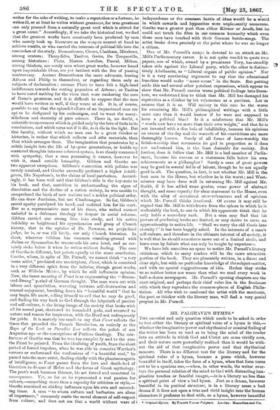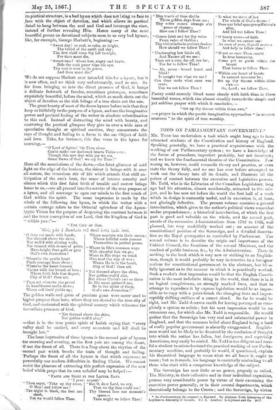MR. PALGRA.VE'S HYMNS.*
TIIE essential and only question which needs to be asked in order to test either the literary or spiritual value of a hymn is this,— whether the imaginative power and rhythmical or musical feelingof the writer has been so used as to bring the mind of the reader into an attitude in which God and Christ are more vividly seen, and their nature more powerfully realized than it would be with- out the aid of that imaginative power and that rhythmical measure. There is no different test for the literary and for the spiritual value of a hymn, because a poem which, however beautiful in itself, takes the form of a hymn, when that form turns out to be a spurious one,—when, in other words, the writer over- lays the personal relation of the mind to God with distracting ima- ginative touches or fanciful images,—is in a literary no less than a spiritual point of view a bad hymn. Just as a drama, however beautiful in its poetical structure, is in a literary sense a bad drama if it does not open a true and vivid insight into the human characters it professes to deal with, so a hymn, however beautiful • Original Hymns. By Francis Tamer Palzrare. Len-iou Msc,JIanand Co. its poetical structure, is a bad hymn which does not briu us face to. face with the object of devotima, and which allows its poetical detail to hang between the soul and God and intercept the view, instead of further revealing Him. _Hence many of the most beautiful poems on devotional subjects seem to us very bad hymns, like, for example, George Herbert's, beginning
"Sweet day! so cool, so calm, so bright, The bridal of the earth and sky; The dew shall weep thy fall to-night, For thou must die.
"Sweet rose! -whew hue, angry and brave, Bids the rash gazer wipe his eye, Thy root is ever in its grave, And thou must die."
We do not suppose Herbert ever intended this for a hymn, but it is now often, and we think very unfortunately, used as one. So far from bringing us into the direct presence of God, it hangs a delicate fretwork of fancies, sometimes grotesque, sometimes exquisitely beautiful, before the mind, which as much shuts out the 'object of devotion, as the rich foliage of a tree shuts out the sun.
The great beauty of most of the dozen hymns before us is that they keep so faithfully to the purpose of a hymn, and use the imaginative power and poetical feeling of the writer in absolute subordination to this end. Instead of distracting the mind with beauty, and scattering the poetical glimpses they give us over a wide area of speculative thought or spiritual emotion, they concentrate the rays of thought and'feeling to a focus in the one Object of faith and love. Take, for instance, this fine verse in the hymn for morning,—
" &Lord of lights! 'tie Thou alone
Can'st mike our darkened hearts Thine own : Though this new day with joy we see, Great Dawn of God ! we cry for Thee !"
,Here all the associations of the dawn,—the faint glimmer of cold ,light on the edge of the horizon, the shiver it brings with it over all nature, the tremulous stir of life which attends that chill an- ticipation of the Bun's heat, the sense of intense serenity and silence which this first faint birth of trouble and sorrow brings home to us,—are all pressed into the service of the true purpose of .a hymn, and all converge to open our minds to the first touch of ,God within the spirit. The same impression is made by the whole of the following fine hyinn, in which the writer with a certain courage refers to the Oriental splendour of the Apoca- lyptic Vision for the purpose of deepening the contrast between it _and the truer conception of our Lord, that the kingdom of God is within you
"TEE CITY OF GOD.
7ap u ,.3us7Efa 0Eoli ii7L; uo ;dr/.
'The golden walls and gates of precious gems were never used to 'higher purpose than here, where they are denied to the true city of God, and contrasted with the spiritual scenery which witnesses the immediate presence of God.
"Not throned above the skies,
Nor golden-wall'd afar,"
—that is in the true poetic spirit of Isaiah crying that "every valley shall be exalted, and every mountain and hill shall be brought low."
The least impressive of these hymns is the second pair of hymns :for morning and evening, as the first pair are among 'the finest, 'if not the finest of all. There is a limp about the rhythm of the
• second pair which breaks the train of thought and feeling. Perhaps the -finest of all the hymns is that which expresses ,so powerfully our modern difficulties in finding Christ. We cannot resist the pleasure of extracting this perfect expression of the new -belief n-hieh prays that its own unbelief may be helped :— " Farm AND SUJET IN THE LATTER DAYS.
" prae. sequar.'
• "Thou sayst, 'Take up thy cross, "Bat 0 doar Lord we cry. 0 Alan! and follow me :' The night is black, the feet are
slack, Yet -we would follow Thee.
"0 thou not tnado with hands, Not 'throned above the skies, • Nor wall'd with shining walls, Nor framed with stones of price, More .bright. than gold or gem God's own Jerusalem !
"Where'er the gentle heart Finds courage from above ;
• Where'er the heart forsook Warms with the breath of love ; Where faith bids fear depart, City of God ! thou art.
" Thou art where'er the proud In humbleness melts down ; Where self itself yields up; Where martyrs win their crown; Where faithful souls possess Themselves in perfect peace.
"Where in life's common ways With cheerful feet we go; When in His steps we tread Who trod the way of woe ; Where Ho is in the heart,
City of God! thou art.
"Not throned above the skies, Nor golden-waIrd afar, But where Christ's two or throe In His name gather'd are, Be in the midst of them, God's own Jerusalem !"
That we thy face could see ! Thy blessed face one moment's I space— Then might we follow Thee !
Poetry could scarcely blend mole closely with faith than in these beautiful verses, which rise almost steadily towards the simple and yet sublime prayer with which it concludes,—
" Set up thy throne within thine own,"
—a prayer in which the poetic imagination approaches "in nearest nearness " to the spirit of true worship.
"Dim tracts of time divide Those golden days from me ; Thy- voice comes strange o'er -years of change ;
How can I follow Thee ?
"Comes faint and far thy voice From vales of Galileo ; Thy vision fades in ancient shades; How should we follow Thee?
"Unchanging law binds all, And Nature all we see : Thou art a star, far off, too far, Too far to follow Thee!
"—Mi, souse - bound heart and blind!
Is naught but what we see ? Can time undo what once was true; Can we not follow Thee ? Is what we trace of law
The whole of God's decres ? Does our brief-span grasp Nature's plan,
And bid not follow Thee?
"0 heavy cross—of faith In what we cannot see!
As once of yore, thyself restore And help to follow the'e !
"If not as once Thou mord In true humanity,
Come yet as guest within the breast That burns to follow Thee.
" Within our heart of hearts In nearest nearness be ;
Set up thy throne within thine
OWE :— Go, Lord ; we follow Thee.































 Previous page
Previous page